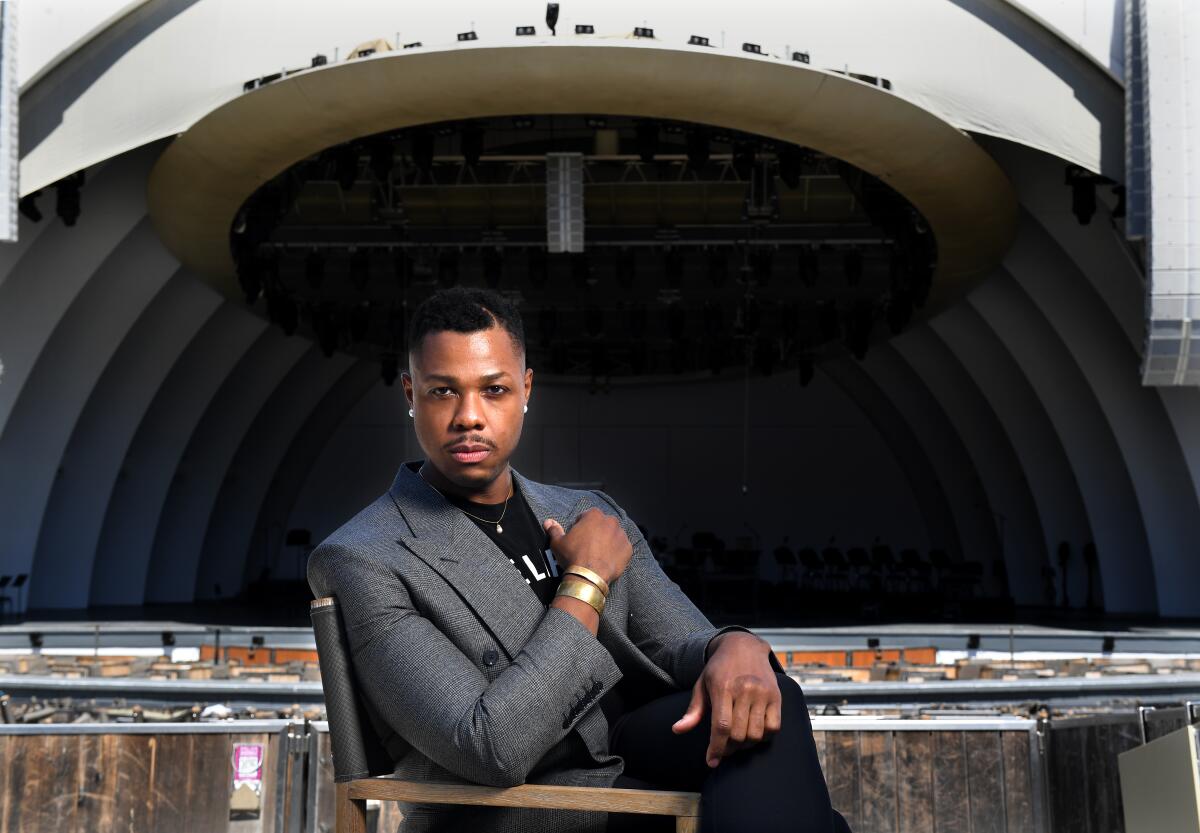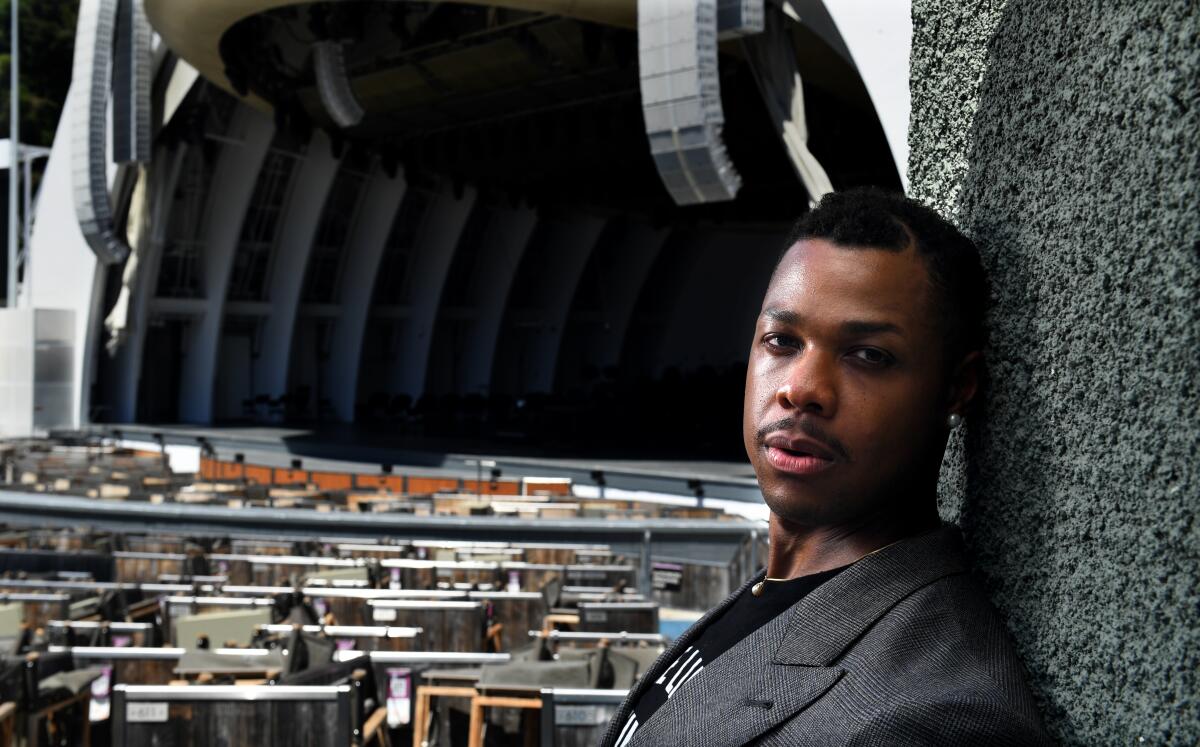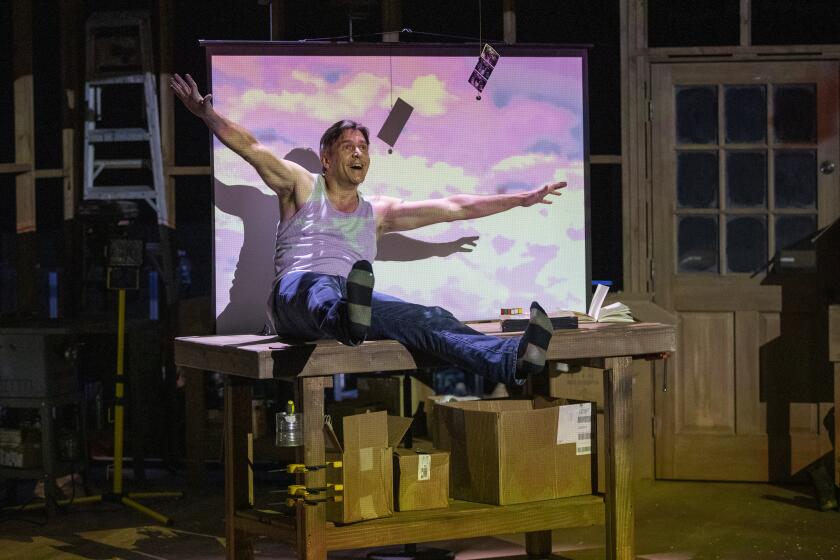How bass-baritone singer Davóne Tines is rethinking America’s anthem

- Share via
Davóne Tines has love on his mind. The night before our Zoom chat, the tall bass-baritone tells me that he went on a fantastic dinner date at a steakhouse in Vail, Colo., where he was performing at the 2022 Vail Dance Festival. “It was great, and I spent way too much money and ate a lot of wagyu beef,” he says with a content smile.
While in Vail, the 35-year-old creative also workshopped a new piece that meditates on the concept of love — more on that later — and finalized the lighting scheme and other details for tonight’s premiere of “Concerto No. 2: Anthem” at the Hollywood Bowl, a new work he devised and created in collaboration with poet Mahogany L. Browne, and composers Michael Schachter, Caroline Shaw and Tyshawn Sorey.
Apart from a handful of major world premieres and reprisals, Tines has spent less of his career singing conventional roles in opera houses and more energy creating musical works that double as deeply personal, thoroughly considered artistic statements.
A decade ago, Tines found himself wrestling with the reality of life as a Harvard-educated, Juilliard-trained, Black American vocalist performing for largely white audiences. As he considered his situation intellectually and emotionally, he worked through it musically. Over the course of several years — and working in conjunction with Schachter and director Zack Winokur — he developed a musical theater work based on Langston Hughes’ poem “The Black Clown” that premiered at the American Repertory Theatre in 2018 to acclaim. (Tines says the work is now “potentially slated for Broadway, we hope.”)
In 2021, Tines unveiled “Recital No. 1: Mass” at the First Congregational Church of Los Angeles. Centered around a newly composed setting of the Latin Mass by Shaw and featuring music by Bach alongside traditional American spirituals, the recital was Tines’ way of deconstructing classical music’s historically strict performance practices.
Tines’ approach avoids a total demolition of form and instead utilizes and reinterprets established classical music structures. He followed “Recital No. 1: Mass” with “Concerto No. 1: Sermon,” a vocal interpretation of an orchestral form that traditionally juxtaposes a violin, piano, or other instrumental soloist with the bravado of a full orchestra. “Concerto No. 1: Sermon” maintained the concerto’s conventional structure — three movements contrasting soloist and orchestra — while exploring more contemporary thematic and vocal realms.
As the work’s soloist, Tines’ lent his potent, memorable voice to a meditation on social justice. He also co-created “Vigil,” a newly-composed portion of the concerto dedicated to the memory of Breonna Taylor. As he explained in a promotional video: “I wanted to share with an audience what it might mean to be a marginalized identity wanting to be able to move in a way or exist in a way in spite of marginalization.”
In L.A. appearances — Julia Bullock at the Hollywood Bowl, Davone Tines at Monday Evening Concerts — they reveal opera’s future.
This week, Tines is unveiling his new work “Concerto No. 2: Anthem,” the result of a Los Angeles Philharmonic commission. The orchestra asked Tines to create something for their Thursday “American Stories” concert at the Hollywood Bowl, which Joseph Young will conduct. Tines says that when he met with Young to discuss the performance, they asked themselves, “What will two Black men, standing in front of this orchestra [with] this large platform and huge venue, choose to say?”
It seemed like the perfect opportunity to “perform a magic trick,” Tines says. Why not “turn the Star-Spangled Banner into ‘Lift Ev’ry Voice?’”
“Lift Ev’ry Voice,” a hymn written and composed by brothers James Weldon Johnson and J. Rosamond Johnson, is known as “The Black National Anthem.” Its lyrics don’t involve bombs bursting in air or references to war and enslavement. Instead, it calls upon the collective, asking every voice to come together and sing joyfully about liberty.
Tines says that the current U.S. national anthem “outlines very colonialistic ideals.” While the first, familiar verse echoes “the idea of sovereignty through war and conquering,” he says, things get darker in subsequent stanzas that include imagery of trampling your enemies and instilling fear in enslaved people.
“These are not the foundations I think our country should stand on,” Tines says.

When Tines has ideas for musical arrangements or new pieces, he scribbles them down on paper or types them up in a word doc, not unlike a storyboard. These notes then act as a point of inspiration and a map for the composers he collaborates with.
For “Concerto No. 2: Anthem,” Tines asked Schacter to create an arrangement of the first verse of “The Star-Spangled Banner” that would lean into the Hollywood Bowl’s grandeur. Give me “Super Bowl, Disney World, MGM Musical, Whitney Houston,” he said. For verses two and three, he specifically wanted the mood to shift. His notes for these verses read, “Eerie, blood-soaked battlefield” and “grotesque.”
Tines doesn’t consider himself an activist. He doesn’t create a recital or concerto with an agenda. His art is more process-driven, a working out of feelings and ideas through music, text, artistic collaboration, and performance. If he considers a question artistically, he is also considering it personally: What does it mean to be a Black performer in white spaces? What does it mean to be a Black American? What does it mean to be American?
For Tines, being an American means being the descendant of enslaved ancestors. It means being the grandson of a retired naval officer who also served as the local church choir pianist. It means growing up in Fauquier County, Va., a picturesque, mostly white community southwest of Washington, D.C. Tines describes it as “a really complicated place that exists in the remnants of the Civil War, a place where contradictions are wrapped in the beauty of its landscape.”
Those deeply Southern, deeply American contradictions were apparent throughout Tines’ early years. He describes life in Fauquier County as “like growing up in a Ralph Lauren ad” and recalls singing “The Star-Spangled Banner” before weekend polo matches in high school. A talented young violinist, he played in youth orchestras with all-white or mostly-white peers. “I can honestly say that outside of my family and church community, I had one Black friend,” he says about his childhood and high school days.
Attending services at Providence Baptist Church in Orlean, Va., with his grandparents, who raised him, connected him with his local Black community and influenced him musically. Church choir practices at Providence Baptist Church, which went on for hours, were “a labor of love,” he says. As a young boy he was often bored and “rolled around on the floor wondering when it would be over.” But he also became obsessed with triads, or chords — the combination of three notes sounding simultaneously that forms the basis of Western harmony — as he internalized gospel rhythms and watched his elders experience ecstatic, music-driven worship experiences.
Tines’ musical ideas reflect his life experiences, combining the classical forms and timbres he fell in love with as a young violinist and studied in-depth at Juilliard with the gospel traditions pivotal to his upbringing. His artistic work has also consistently grappled with race and identity. “Concerto No. 2: Anthem,” continues that thematic path, but for his next project — a recital focused on the theme of love — he’d like to step away from the heaviness of America’s racial wounds and wrought politics.
“I’ve done a lot of work dealing with race and identity,” Tines says. “You reach a saturation point, maybe even a certain point of exhaustion.”
Perhaps that’s why “Lift Ev’ry Voice” means so much to him right now. Unlike the current U.S. national anthem, which he says glorifies a bloody past, the “Black National Anthem” is inherently positive and forward-looking.
“The majority of the [American] population can exist in a way that romanticizes the past,” Tines says. “But I think [Black people] have to be future-leaning because that’s the only way we can move toward a place where we actually feel welcome. ‘Lift Ev’ry Voice’ is perhaps a better choice [for a national anthem] because it is about collective unity. Liberty, freedom — that’s what harmony is.”
This week, L.A. Opera premieres “In Our Daughter’s Eyes,” a new one-man opera by Pulitzer Prize-winning composer Du Yun; “Everything Rises,” commissioned by the UC Santa Barbara Arts & Lectures series and featuring Davóne Tines and the violinist Jennifer Koh, also opened.
The forthcoming work is reflective of how Tines is focused on pursuing harmony and love in his personal life. “I’m really happy at this point in my artistic life to start on a journey of pursuing something a bit more personal, but also potentially universal,” he says, adding that he’s been reading about love in the works of C.S. Lewis and bell hooks.
And that wonderful date he went on in Vail? It was a solo affair.
“Right now I’m having a really nice time dating myself,” Tines says. “I’m quite excited about exploring what self-love actually is so that I can share that with others.”
This Thursday night, as he steps on stage at the Hollywood Bowl in a custom white dinner jacket commissioned from Black tailor Brandon Murphy of B|M|C, look for sparks of Tines’ next project while considering his proposal: a new, more inclusive, more joyful, more loving anthem for America’s future.
More to Read
The biggest entertainment stories
Get our big stories about Hollywood, film, television, music, arts, culture and more right in your inbox as soon as they publish.
You may occasionally receive promotional content from the Los Angeles Times.












